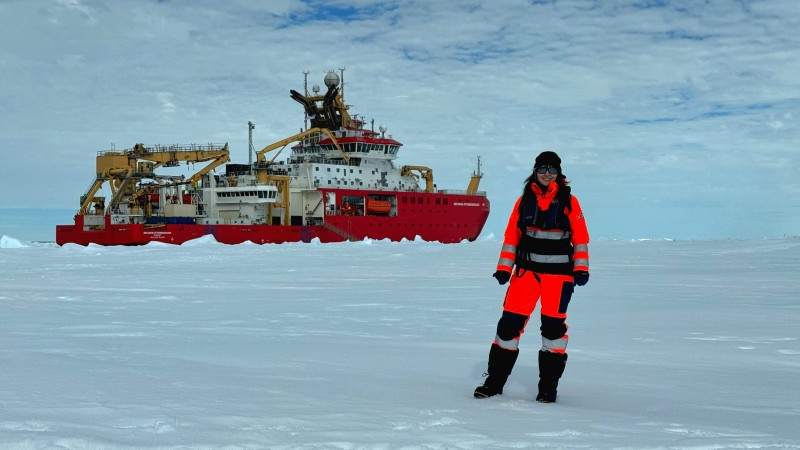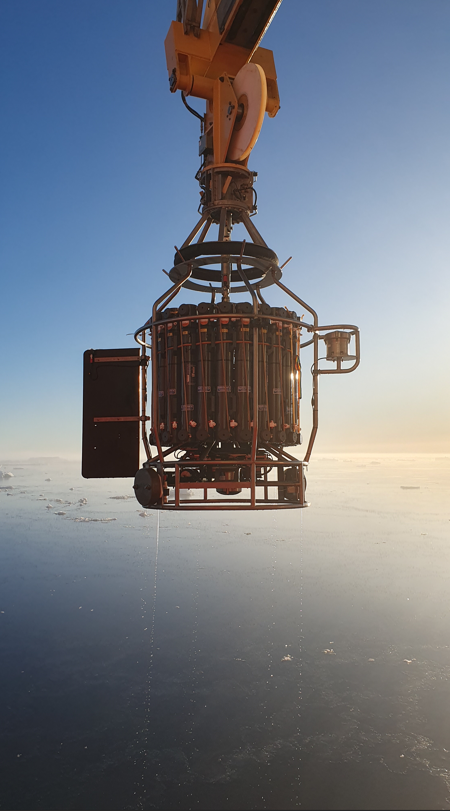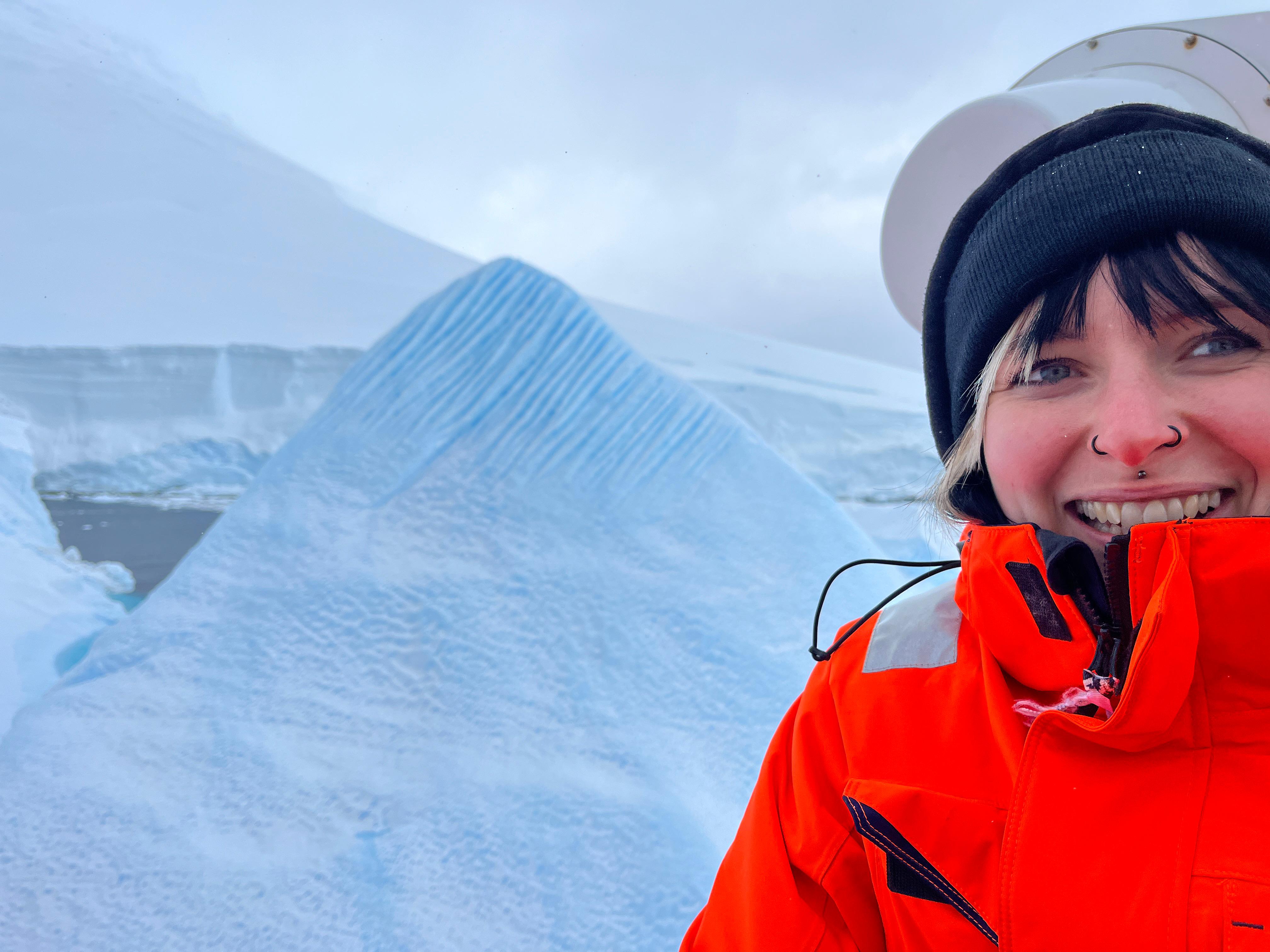Chasing after the Fate of Carbon in the Antarctic Weddell Sea
Chiara Krewer
University of Leeds

In early January 2024, me and 32 scientists from different institutes within the UK arrived in Punta Arenas at the southern tip of Chile and boarded the RSS Sir David Attenborough (SDA) ahead of the PICCOLO research expedition. Just a day later, we were all standing on deck waving good-bye to the port and civilisation with a big smile on our faces. Our direction: The Weddell Sea.
PICCOLO (Processes Influencing Carbon Cycling: Observations of the Lower limb of the Antarctic Overturning) is part of the RoSES research program funded by NERC. The aim of the 52 day expedition is to trace the fate of carbon in the Southern Ocean and to investigate the biological and chemical interactions of carbon with the atmosphere, ice, and the surface water, before carbon is descending to the ocean’s deeper depths. Armed with the newest technology, and a science-team from many different disciplines, we were ready to collect data from one of the most remote and least accessible place on Earth.

As part of the Trace Metal geochemical team, my role on the ship was to split into two projects: Together with Angie Milne and Simon Ussher (University of Plymouth), we collected water samples the SDA clean laboratory ready to be analysed for iron and other trace metals once back onshore. Why iron you may ask? The C cycle is deeply connected with photosynthesis, a biological process that requires not only carbon dioxide and light, but also nutrients. And while major nutrients like nitrate and phosphate are rich in cold waters, iron can only be found in very small concentrations. Understanding the sources and mechanisms that supply iron to the ocean therefore is crucial. However, the small seawater concentration of iron comes with challenges: Since the SDA is basically a big red metal box, special care has to be applied when collecting and processing samples to avoid any kind of contamination from metals from the ship. Water samples from different depths were therefore collected with a titanium-frame CTD rosette, equipped with 24 trace-metal free samples bottles, and then processed in the ultraclean laboratory.
For the second project, I supported Will Homoky and Alastair Lough from the University of Leeds in the collection and measurement of radium in water samples collected from the CTD rosette. The short lifespan of Radium atoms and the predictable decay rates can be used to track the movement of water masses and combined with iron, sources and pathways of iron sources to the ocean can be investigated. While contamination during the Radium collection process is less likely (since there is very little radium around), the low concentration of Radium in the water requires the filtration of big volumes of water (120 L) to retrieve enough Radium atoms to carry out the measurement on board. A work that requires quite a lot of physical strength!
While our days were very much centred on the CTD-rosette operations, a lot of different science activities were taking place as well. One of my highlights of the expeditions were the work we carried out on an ice-floe. On a glorious sunny, wind-still day, we walked off the ship onto a large ice-floe where we drilled holes through the ice to collect both ice cores and water samples from beneath the sea ice. Under the watchful eyes of very nosy Emperor penguins!
Strong winds, currents and unexpected sea ice cover forced us to constantly change plans and directions – flexibility, creativity and adaptation to the unknown is definitely the most useful tool in our toolbox. Yet, the research cruise has been a full success, not only due to high expertise of all the people involved but also because of the positive attitude nourished by the kindness and relentless enthusiasm of the science team and the ship’s crew. It was such a privilege for me to join this multidisciplinary team for the PICCOLO project so early on in my research career. This expeditions did not only expanded my practical skill set, it also gave me the opportunity to get to know scientist from different backgrounds, and create a bond on a professional as well as personal level that is unique. I am beyond grateful to the leaders of the project as well as for the Challenger Society of Marine Science who made my involvement in this cruise possible – an unforgettable experience that will shape my future career.

Profile
I am a fourth year PhD student at the University of Leeds, working with Prof Simon Poulton. I am funded through the NERC Panorama DTP, looking into water column reconstruction and ocean-climate interactions during deoxygenation events in deep time using a combination of geochemical multi-proxy approach (iron, phosphorous and redox-sensitive trace metals) and biogeochemical modelling. In previous projects, I focussed on the behaviour of iron and trace metals in modern aquatic systems.
Latest News
Royal Society Publishing Photography Competition 2025
Please see a message from the Royal Society below:
We are delighted to announce that the 2025 Competition is now open for entries until 15 August for a chance to win £1000! The competition celebrates the power of photography in conveying the wonder of science happening all around us and photographs can be submitted in the categories of: Astronomy, Behaviour, Earth Science and Climatology, Ecology and Environmental Science, and Microimaging.
The competition is free to enter and open to anyone studying or working in science at graduate level or above. Category winners will receive a one-year membership to the Royal Photographic Society and the overall winner will receive a grand prize of £1,000. Find out more: https://bit.ly/RSPphotocomp
October 2025 MEDIN Workshop: Marine Data Management, Governance and the MEDIN toolset
The Marine Environmental Data and Information Network (MEDIN) are pleased to announce that registration is now open for the next occurrence of our popular free online training workshop: ‘Marine Data Management, Governance and the MEDIN toolset’ on the 13th – 17th October 2025 on OceanTeacher Global Academy.
Marine Data Management, Governance and the MEDIN toolset
The Marine Environmental Data and Information Network (MEDIN) and OceanWise are delighted to invite you to attend our popular free online training workshop: ‘Marine Data Management, Governance and the MEDIN toolset’ on the 19th – 23rd of May 2025.
